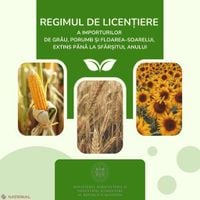On June 24, 2025, the Government of the Republic of Moldova officially extended the licensing regime for imports of wheat, corn, and sunflower until December 31, 2025. This decision is a strategic move aimed at supporting local farmers amid a regional market currently flooded with production surpluses and low prices. The extension continues a policy framework first introduced in October 2023, which has so far helped maintain stability in the domestic agricultural market by regulating imports and protecting local producers from unfair competition.
Minister of Agriculture and Food Industry, Ludmila Catlabuga, emphasized the protective nature of this measure, stating, "The extension of the licensing regime is a protective measure. We want to give farmers the chance to sell their harvests." Her remarks underline the government's commitment to safeguarding the livelihood of Moldovan farmers, who face challenges from cheaper imports, particularly from neighboring Ukraine, where prices have been significantly lower.
This licensing mechanism was initially introduced on October 11, 2023, and was designed to prevent an influx of imports that could undermine local production. By controlling the volume of imported wheat, corn, and sunflower, the government aims to avoid market saturation and protect domestic prices. The policy was first extended until June 30, 2025, and the latest decision prolongs it through the end of the year, reflecting ongoing concerns about market conditions.
Data collected from agricultural fields at the beginning of June 2025 show promising signs for the domestic crop outlook. Wheat, corn, and sunflower crops are reported to be in good condition, with wheat showing a particularly high production potential. Corn and sunflower crops have also had a favorable start to their growth cycle, suggesting a positive harvest season ahead. These trends are not unique to Moldova; similar patterns have been observed in neighboring countries where spring weather conditions and agro-climatic resources have been favorable for crop development.
However, despite these positive agricultural indicators, the regional market remains dominated by surplus production and depressed prices, factors that continue to pressure Moldovan farmers. The licensing regime thus serves as a buffer, offering local producers a more level playing field against cheaper imports that could otherwise flood the market and depress prices further.
Notably, a few weeks prior to the government's latest decision, two major agricultural organizations—the "Forța Fermierilor" (Farmers' Force) and the National Federation of Farmers—called for the inclusion of rapeseed in the list of products subject to import licensing. Their proposal aimed to extend protections to another vital crop. However, this suggestion was not supported by the government in the recent extension, signaling a more cautious approach to expanding import controls.
The context surrounding this licensing regime reflects broader challenges in the agro-food sector, where persistent difficulties have necessitated government intervention to stabilize the market. Minister Catlabuga explained, "The measure represents a continuation of the previously applied framework and aims to maintain the stability of the domestic agricultural market amid persistent difficulties in the agri-food sector." This underscores the ongoing vulnerabilities faced by farmers, from price volatility to competition from imports, which have significant implications for food security and rural livelihoods.
The government's approach aligns with a regional pattern where many countries are grappling with similar issues. Favorable natural conditions this spring have led to abundant harvests across the region, but this abundance has also contributed to oversupply and price drops. In such an environment, protecting local farmers through import licensing becomes a critical policy tool to prevent market distortions and support sustainable agricultural development.
Looking ahead, the extended licensing regime will remain in effect until the end of 2025, providing a continued safety net for Moldovan farmers. It allows them to better plan their production and marketing strategies without the immediate threat of being undercut by low-priced imports. While the government has refrained from expanding the licensing to other crops like rapeseed, the current policy reflects a balance between market protection and trade openness.
In summary, Moldova’s decision to prolong the import licensing for wheat, corn, and sunflower demonstrates a clear commitment to sustaining its agricultural sector in a challenging regional market. By managing imports strategically, the government supports local farmers, encourages stable production, and seeks to maintain the health of the domestic agricultural economy through the end of 2025 and beyond.




